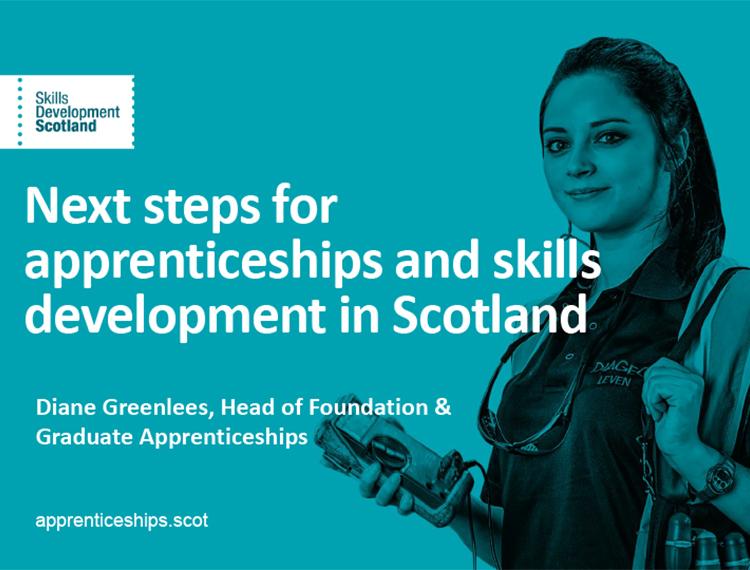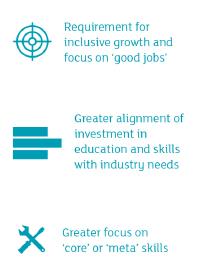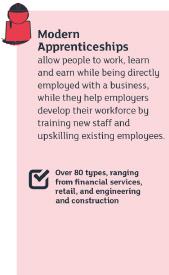Next steps for apprenticeships and skills development

Skills Development Scotland are the national skills body for Scotland and we work with our partners to drives skills planning and development in Scotland, to develop and promote the value of work based learning for individuals, for employers and for the economy, and to achieve greater equality of opportunity for all.
Our approach aims to improve the response of education and training to meet the needs of industry and to give people in Scotland the best possible chance of securing jobs and succeeding in the world of work.
Our vision is of a Scotland that values skills, enabling people and businesses to reach their potential and contribute to building a competitive, inclusive and resilient economy. We will do this by continuing to embed an industry led work based approach to skills development. This will deliver higher levels of employer engagement and more and better learning pathways for young people.
Our core purpose is to make skills work for Scotland.
Looking to the Future
What are our ambitions and what are the key drivers for developing work based learning pathways?

Change is upon us, we are facing technological advances of the fourth industrial revolution, with rapid technological change. We are facing demographic shifts as the population ages, we are facing Brexit and we face the continued pressure on public funds. These changes are all having wide ranging impacts on our lives, work and the economy. In the face of change the Scottish Government has great ambitions around improving productivity, standards of living and inclusive growth.
Now more than ever we need people with the right skills to create the innovations that will drive an economy, that is inclusive, promotes wellbeing and builds sustainable growth. Skills are at the heart of ensuring individuals can gain access to good work, there needs to be a focus on inclusive growth through encouraging individuals from a more diverse background to take on skills that will meet industry demands and we need to work with industry to maximise returns on investment from across the skills and education system to boost economic growth and competitiveness.
There needs to be much greater alignment of education with the skills system, and this means working hand in hand with industry in order to develop individuals and ensure they are equipped with the relevant skills needed to support the economy now and into the future.
Looking to the future we need to equip both Scotland’s businesses and our future workforce with knowledge, skills and capabilities that enables us to compete in an increasingly complex and changing environment and economy, and looking to the future we believe high quality work based learning pathways, is a big part of the solution to meeting the productivity and inclusive growth ambitions.
Looking to the future high quality work based learning pathways will lead us to the high performing inclusive labour market that will enable Scotland to flourish.
Developing Work Based Learning Pathways
There is significant international evidence to show that strong systems of work based learning contribute to low unemployment, fewer skills shortages and high economic and inclusive growth.
Over the last few years SDS has been working to strengthen the pathways in Scotland, building on the successful modern apprenticeship programme, SDS has been working with Scottish Government, with industry, with education and training providers to extend the apprenticeship family with the introduction of new foundation and graduate apprenticeships.
These new developments are designed based on what the top performing OECD countries are doing well, and they are designed the help support Scotland in its ambition to be a top quartile OECD performer in the future.
Taken together foundation, modern and graduate apprenticeships offer work based learning pathways for individuals with multiple entry and exit points, that develop high level skills, support career progression in key sectors and address the skills shortages we are facing now and over the next 5 to 10 years.
It’s really important to emphasise that these new developments in the apprenticeship family are employer led and designed by industry, for industry, and delivered with industry. So the skills apprentices learn are the ones employers want and need.
So all of the new developments and expansion plans over the next few years are focusing on the key growth sectors in Scotland and also identified and projected skills gaps highlighted through skills investment plans and our ongoing work with industry.
Key Developments
Now to focus on some of the key developments. We developed and expanded the provision of foundation apprenticeships. Foundation apprenticeships are a really exciting new work based opportunity and qualification within the senior phase of secondary school. They offer a new and innovative way for young people and industry to work together to provide young people with the skills, experience and qualifications they need before they leave school.
They’ve been designed to ensure they offer multiple progression pathways for young people and they have the value and equivalence within the senior phase curriculum as the other more traditionally understood and recognised academic qualifications like Highers. I think it’s really important to emphasise that foundation apprenticeships taken alongside other school subjects actually provide young people, on completion, with multiple progression routes. They are better equipped to progress into jobs, and into modern apprenticeships, and they are also recognised as entry qualifications into further education or higher education, so it’s opening up pathways and opportunities, it’s about enrichment of the senior phase curriculum and not an either/or.
We are continuing to expand the modern apprenticeship opportunities in key growth sectors with a focus on STEM, enabling more employers to train and upskill staff, and we have also developed the new graduate apprenticeships, new work based learning opportunities and a new and alternative apprenticeship route into degree level study.
So now in terms of expansion, some key stats in terms of where we’ve reached at the end of 2017:

Foundation Apprenticeships
So firstly foundation apprenticeships, we started with early pathfinders in 2014/15 and by August 2017 we had more than 1200 young people starting foundation apprenticeships across the country. We now have 2 two thirds of secondary schools involved, and delivery across 32 local authority areas with frameworks in 10 key sectors.
From August next year we are about to announce a really significant expansion, with an ambition for all schools to be involved and we will also see significant expansion in the number of people starting Foundation Apprenticeships, with frameworks expanded to 12 growth sectors. So from the early pathfinders in 2014/15, there is been significant expansion in FA opportunities and that’s down to the really strong leadership from industry, from colleges, working with other training providers and many partners in this room today.

Modern Apprenticeships
Now to modern apprenticeships, in 2017/18 we will offer more than 27,000 modern apprenticeships, working with 12,000 employers and training providers across Scotland and this is in line with Scottish Government’s ambition to reach the 30,000 starts annually by 2020.
And we are continuing to increase the numbers of starts in both STEM and Higher level frameworks as well as increasing starts from underrepresented groups, so equality is a big driver in terms of access of opportunity to all individuals across Scotland.

Graduate Apprenticeships
And the new graduate apprenticeships, the newest member of the apprenticeship family, we have our first phase of delivery in 2017 and we are moving into a further phase of development and expansion with 11 frameworks available for graduate apprenticeships designed by industry from 2018.
Benefits
For us we see there are four key benefits for Scotland:
- First benefits for individuals, these include greater work readiness in key sectors, greater chance of gaining and sustaining employment, increased opportunity for career progression and reducing the time to get into work on leaving education.
- Second, benefits for employers include work ready individuals, increased productivity of employees, access to a talent pipeline where there are key skills shortages and reduced recruitment costs, and
- Third benefits for key industry sectors, including improved higher level skills and T Shaped professionals with both the technical skills but also the key meta skills that we need for future jobs, and also key new industry designed qualifications in these sectors.
- Finally benefits to the Scottish economy including improved youth employment rates, efficiencies in reducing the time for learners to get into employment and improved productivity.
So looking to the future we believe high quality work based learning pathways could lead us and will lead us to the high performing inclusive labour market that will enable Scotland to flourish.
Diane Greenlees, Head, Foundation and Graduate Apprenticeships, Skills Development Scotland speaking at the Scotland Policy Conferences Keynote Seminar: Next steps for apprenticeships and skills development in Scotland held on 6th December 2017.
Despite best endeavours to ensure accuracy, text based on transcription may contain errors which could alter the intended meaning of any portion of the reported content. Speakers have not had the opportunity for any corrections.











Responses